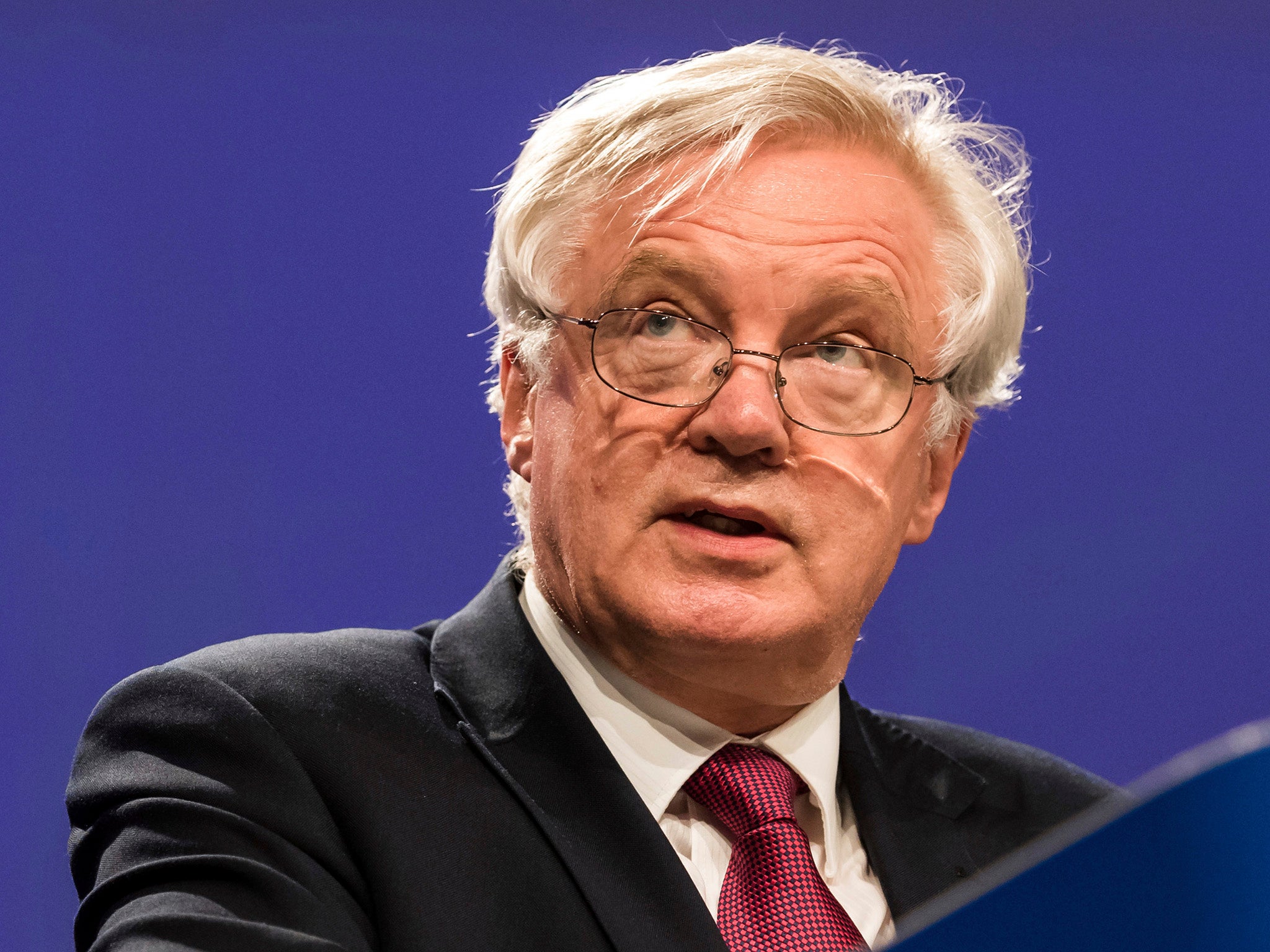David Davis: Brexit Secretary on collision course with business leaders over EU single market and customs union
'Our proposal is for the UK to stay in the single market and a customs union until a final deal is in force' said the director-general of the CBI

Brexit Secretary David Davis is on collision course with business leaders as the Government is warned Britain must remain in the single market and customs union until a final Brexit deal is in force.
It comes after Mr Davis said last month that while there will be a three-year transitional period until 2022, the UK will exit the customs union and tariff-free single market after March 2019 – the end of the two year Article 50 timeframe.
But the demand from the Confederation of British Industry (CBI), which represents 190,000 businesses, is for Government ministers to “build a bridge from the end of the Article 50 process in March 2019 to the new deal” in order to maximise stability and certainty for firms and “avoiding a damaging cliff-edge”.
In a lecture on Friday at the London School of Economics, director-general of the CBI Carolyn Fairbairn will say now “is the time to be realistic” about the negotiations, adding: “Our proposal is for the UK to stay in the single market and a customs union until a final deal is in force.”
Describing the CBI’s approach as “common sense”, she will add: “This would create a bridge to the new trading arrangement that, for businesses, feels like the road they are on. Because making two transitions – from where firms are now to a staging post and then again to a final deal – would be wasteful, difficult and uncertain in itself. One transition is better than two and certainty is better than uncertainty.”
“This is not about whether we are leaving the EU, it is about how. Once the Article 50 clock strikes midnight on 29 March 2019 the UK will leave the EU.” She will also say that waiting until March 2019 “is too late” and that an agreement is needed “fast” in order for the stability of businesses in Britain.
The comments come ahead of a crucial two-day meeting between the Brexit Secretary and business leaders at Chevening House – his private country residence. Representatives are expected from manufacturing, retail, energy and transport, including the CBI and the British Chamber of Commerce, which are lobbying the Government to place business interests first in the negotiations in Brussels.
The call by the CBI is also backed by the manufactures’ organisation EEF, who added the absence of any clarity for British business makes it a “sensible approach to transition”.
Terry Scuoler, the organisation’s chief executive, added: “With a reasonable transition period we can seek to maintain the economic benefits of participation in the single market and customs union. And move quickly to partially settling concerns expressed by many companies that the current approach to Brexit is akin to freewheeling.”
Labour’s Brexit Secretary Keir Starmer said his party agreed with the call from CBI and that the country needs an “early commitment to ensure strong transitional agreements, and that these should be on similar terms to those we currently enjoy.”
Sir Keir added: “Without that commitment, and without a bridge to new trading arrangements with the EU, there will be growing uncertainty for businesses and investment decisions will be delayed.”
But the call from the CBI was immediately criticised by some leading the fight for Brexit during last year’s referendum. Gisela Stuart, the former Labour MP and Leave advocate, said the proposal increases the likelihood of negotiators in Brussels handing Britain a bad deal.
She continued: “The big business lobby would prefer to ignore the mandate from the referendum of taking back control of our laws, borders, money and trade, and instead attempt to keep the UK in the EU by the back door.
“Committing to stay in the EU’s single market and customs union during a transition period would only serve to tie our hands in the negotiations, and make it more likely that the EU gives us a bad deal.”
The CBI will also use the lecture to criticise the Government’s contentious threat to EU leaders that “no deal is better than a bad deal”.
Rain Newton-Smith, the organisation’s chief economist, will add at the lecture on Friday: “A ‘no deal’ scenario would be costly for businesses and consumers. One of the most obvious costs would be tariffs. The UK would face tariffs on 90 per cent of its EU goods exports by value.
“Under these the average tariff on UK goods exports to the EU would be around 4 per cent. If this were applied to total UK goods exports to the EU, the increase in tariff costs would be between 4.5 and 6 billion pounds per year. That’s 0.2 to 0.3 per cent of GDP per year.”
Join our commenting forum
Join thought-provoking conversations, follow other Independent readers and see their replies
Comments